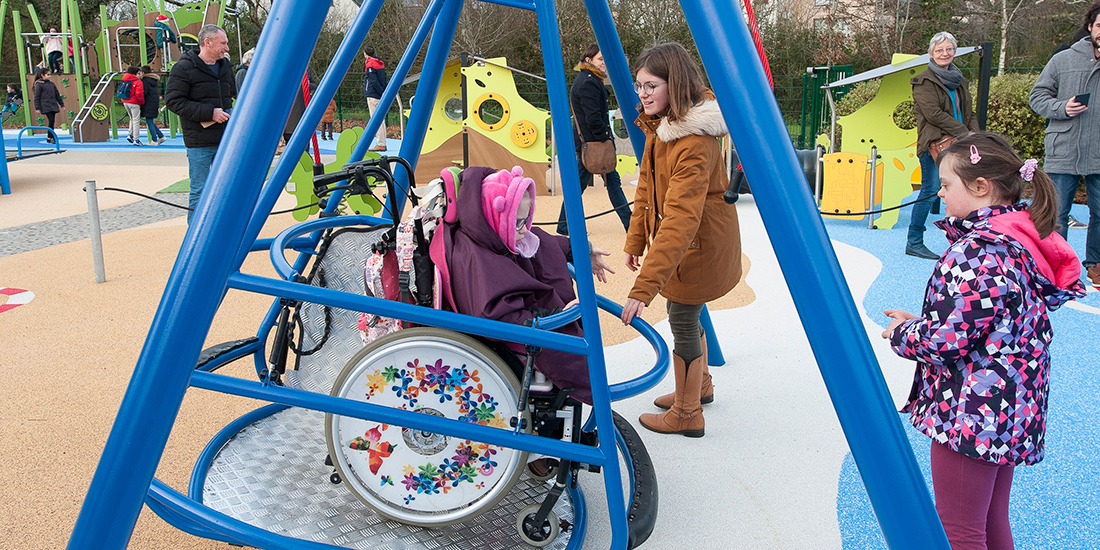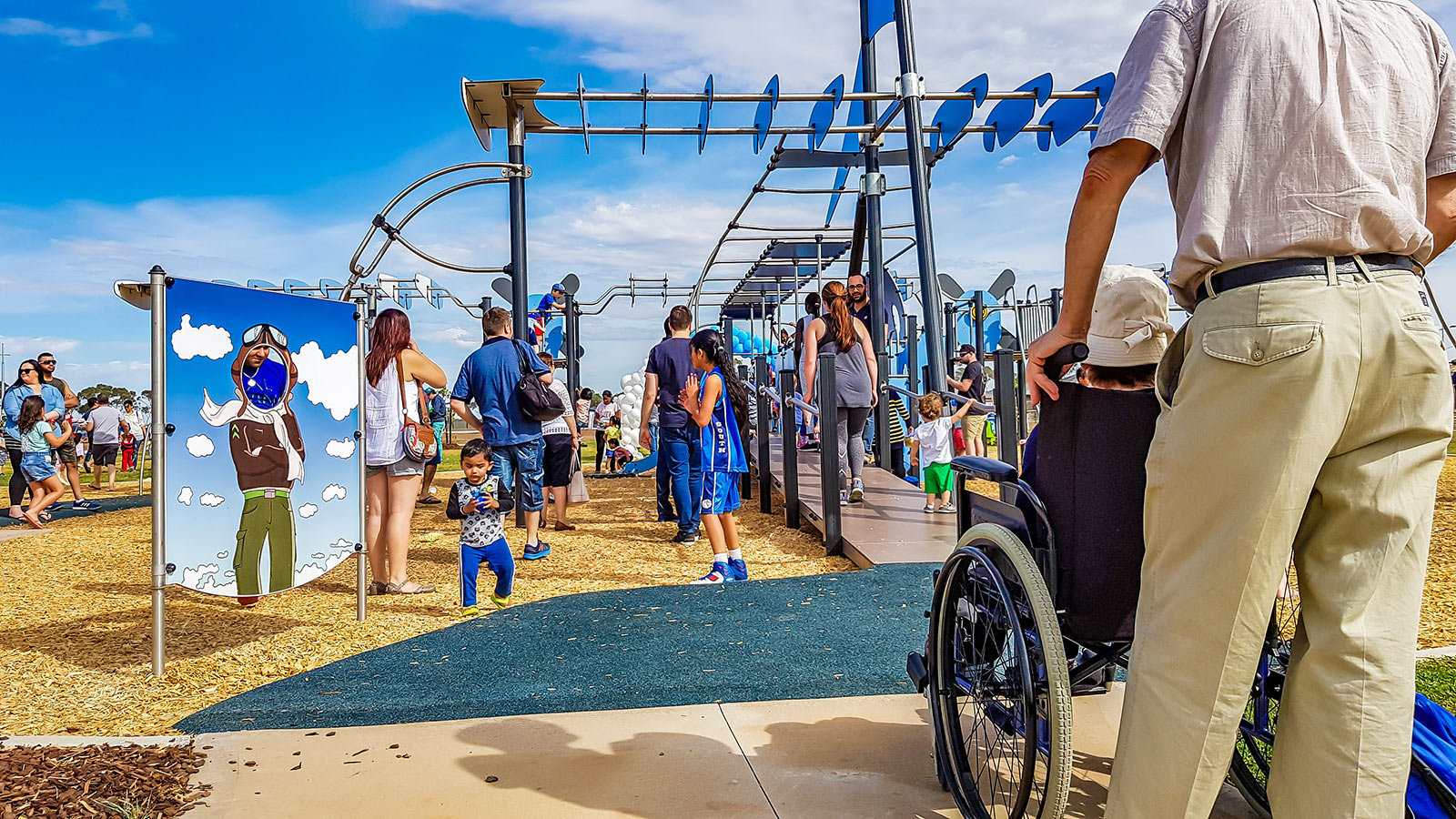Article published on 26 August 2021
Inclusivity is a huge part of education and recreation. Approximately 2.5% of children in the UK are believed to have a learning disability (Mencap). When considering any kind of play or learning activity, considerations and provisions designers must make the experience as inclusive as possible. We combine Proludic and inclusivity to bring these concepts together.
Proludic believes in the philosophy that all children should have access to the same play facilities. We bring that vision to life by providing a range of inclusive play equipment. We design these all to give all children the same opportunities regardless of ability.
What does it mean to be ‘inclusive’?
Inclusivity means that everyone is equal, regardless of ability, age, race, gender or any other differentiating factors. In modern society, nobody should be excluded for something they have no control over. Proludic champion this in the play sector. Working with children that may not have the same capabilities as others means, for us, that we need to create inclusive play spaces that have all children in mind at every step of the process – from planning to playing.
What does inclusive play equipment look like?
No child is the same, and Proludic’s vision is to cater for everybody, regardless of ability. Inclusive playgrounds cater for children with learning difficulties and disabilities. We do this through a range of different methods, such as ground level play for children in wheelchairs, or sensory-stimulating playground equipment for children with sensory issues. Our philosophy is to integrate these models in standard playgrounds, so every child can play equally with their friends, rather than feel separated.
What special needs do you cater to?
Our products aim to be inclusive to as many children as possible. Also, we continue to work hard to cater to the widest range possible. However, some of our products are more frequently associated with certain conditions, which are explored in this article.
Physical Disabilities Requiring Wheelchairs
Children with conditions that require them to use wheelchairs may not have the same physical capabilities as able-bodied children. Rather than accept that their disability prevents them from having the same opportunities as their peers, Proludic have designed equipment that means children in wheelchairs can access the same spaces as able-bodied children. For example:

Swings have a number of benefits for various conditions. For example, they have positive effects on the inner ear of children with auditory impairments, calming effects on children with cognitive impairments, and provide feelings of security to children with visual or postural impairments. The swings with a pod concept, completed with an on-ground ramp, has created a swing accessible to wheelchair users. This is because the direct access from the ground means the wheelchair can be wheeled directly in.
Autism Spectrum Disorder
Children with autism may have different sensory requirements than other children. Although the spectrum is very broad and this does not apply to every child. For those who do experience sensory over or under-stimulation, this can affect the senses. It manifests itself in a number of mannerisms such as covering their ears, avoiding physical touch, or hiding away from crowded or busy areas.
Proludic have considered how playgrounds can be overly stimulating, and how this could be stressful to those with sensory reactiveness. Here’s one example of what we’ve done to make the experience smoother and more inclusive:

Proludic’s playhouses have been designed with every child in mind to create a comforting and inclusive play experience. Featuring wide entrances, supportive elements and lots of space inside for free movement, the play structure is created with the aim of providing a safe space for children with ASD. A space where they can remove themselves from noise and crowds and observe their surroundings at a quiet distance. This is helpful to those experiencing over-stimulation, and is a safe place to regain control over their emotions and environment.
Sensory Impairments
Sensory impairments usually refer to partial or full deafness or blindness, and can also include motory and verbal difficulties. This often manifests in struggling to communicate effectively and can be a difficult and frustrating experience for children.
Often, therapeutic practices have included sensory stimuli to encourage reactivity from the senses, which Proludic have gone on to model in our playground offerings. Part of our vision is to reflect evidence-based findings into ways inclusivity can be incorporated into play spaces, and our products reflect this. One such example of our innovation is our musical flower range:

We design our musical flowers range with multi-sensory stimulation in mind, providing enrichment for all children that play with them. Each flower has two elements to it, painted in bright and complementary colours, that emit a specific sound when the centre piece is rotated. By encouraging physical touch, and designed with captivating sounds and vibrant colours, the flowers are a wonderful stimuli for all ranges of sensory impairments. As an additional bonus, the curved shape of the stems provides optimal usability for children in wheelchairs.
More on Proludic and Inclusivity
We hope that this article has shone some light on a few of the many different conditions we make inclusive play equipment and experiences for. Whilst every child out there has a different level of ability to the next, Proludic’s vision is to give every child the means to live their childhood to the fullest.
If you’d like more information on our products and services, you can contact us.
Recent
Having a Whale of a Time at the Water Adventure Park!
Article published on 16 May 2025
The Water Adventure Play Park in Weston-Super-Mare has been revitalised into a vibrant, seaside-themed leisure destination that captures the spirit of this iconic coastal town. Positioned just off the seafront promenade, the location presented several environmental and logistical challenges. The previous timber equipment had deteriorated due to the harsh coastal climate. While poor drainage across...
Reimagining Play in One of London’s Busiest Green Spaces
Article published on 16 May 2025
Proludic has over 38 years of experience in creating inclusive, inspiring outdoor environments. This is why the London Borough of Waltham Forest chose our team to transform Lloyd Park. This is one of the London borough’s most visited green spaces, attracting over two million visitors annually. The park required a durable, high-capacity play area that...


